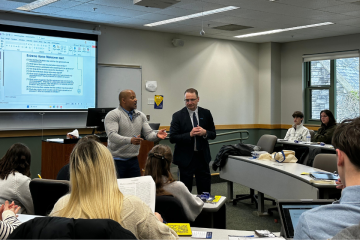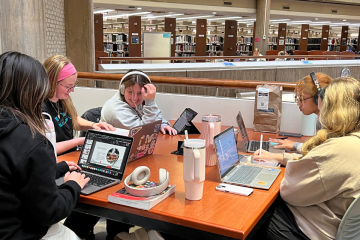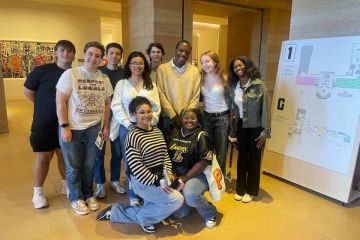Ready for Any Nursing Role
Born premature and weighing only three pounds, Kaylee Horchak ’19 spent the first weeks of her life in a neonatal intensive care unit.
The dedicated team of nurses that cared for her would leave a lasting impression.
“My mom told me ‘because of the great care you received, you are able to run across a field, go to school, and follow your dreams. Maybe one day you can work in a NICU, too,’” recalled Horchak.
Two decades later, Horchak’s life is about to come full circle, as the Widener senior prepares for a career in pediatric nursing.
“I’ve always loved little kids and known that I wanted to give back to the profession that was so influential in my first month of life,” said Horchak, who, following graduation, hopes to gain a spot in the nurse residency program at Children’s Hospital of Philadelphia (CHOP), where she had hands-on pediatrics experience through clinical rotations and an externship.
Many nursing majors gravitate toward pediatrics, especially early in their studies. But Widener students and alumni have pursued rewarding careers caring for patients across the lifespan – from pediatrics to gerontology – and all points in between.
They credit their successes to the robust nursing program, diverse clinical rotations at world-class healthcare facilities in the Philadelphia area, and mentorship from faculty who are experts in their field.
“You have great class settings, support of classmates, and knowledgeable professors and instructors who go above and beyond and share personal examples of what they’ve experienced,” said alumnus Dhruv Patel ’13, a nurse practitioner working with adult oncology patients.
The undergraduate program exposes students to various specialties and care settings so they can find the track that’s right for them. Students conduct clinical rotations in pediatrics, maternity, medical surgical, psychiatric, and population health.
“We’re equipping our students to face any and all situations,” said Dr. Rose Schwartz, associate dean of academic affairs in the School of Nursing. “Students have experience from birth to death because patients are born and patients die. And if you find that the patient population or setting doesn’t work for you, then you have lots of flexibility to change. You can shape your career however you want it.”
Katelyn DeVecchis ’17 thought she was destined for pediatric nursing. That all changed during her psychiatric rotation when she was assigned to an adolescent floor in a behavioral health hospital. DeVecchis loved the experience. “Adolescents need someone to listen to them, and I enjoy just being there for them,” she said.
My professors helped me distinguish the path that was best for me. With their advice, and the experience they have, they help you determine what kind of nurse you are.— Katelyn DeVecchis '17
After graduation, DeVecchis worked on an adolescent unit at CHOP specializing in eating disorders and other diagnoses. She has since moved to the emergency room, but her experiences have proven invaluable.
On the adult end of the patient lifespan, Widener graduates work in all specialties and settings – from hospitals to helicopters.
As a labor and delivery nurse at a busy medical center, Brianna Stead ’17 can help deliver up to three babies per shift. “I love what I do,” said Stead, noting it was a clinical rotation that led her to this area. “The labor process can be frustrating; it takes hours. But most of the time it’s a very happy ending.”
Alumnus Wayne Riddle treats patients of all ages, though most are adults and all are in critical condition. Riddle is a flight nurse, and helps transport patients by helicopter to specialized care facilities.
“Every day is different,” said Riddle, who is back at Widener pursuing his doctorate, with the goal of teaching aspiring nurses full-time. “The opportunities Widener has given me, I wouldn’t be here without them.”
And at the far end of the patient lifespan is Rosemary Lanzelotti ’18, an in-home hospice nurse. Her patients, mostly elderly, are in the throes of their final battles with terminal illnesses. It’s her job to make them as comfortable as possible – physically and emotionally.
“For many patients, I’ve held their hand as they’ve taken their last breath. There are times when I’ve gone home crying,” said Lanzelotti. “But I love what I do. It’s like a calling.”
Lanzelotti was well into her career as a registered nurse when she turned to Widener to earn her bachelor’s degree to help her advance professionally. She had such a positive experience that she’s back pursing her master’s.
Balancing the demands of work and school is not easy, but her professors are flexible and understanding, she said. “They’re fabulous. They know that most of us are working adults and they work with you.”



